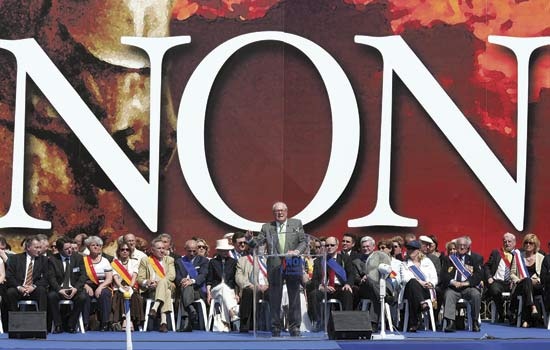Le Pen, Jean-Marie
French politician
born June 20, 1928, La Trinité, France
 French nationalist whose National Front political party represented the main right-wing opposition to the country's mainstream conservative parties from the 1970s through the early 21st century. A controversial figure who frequently was a presidential candidate, Le Pen was accused by his opponents of xenophobia and anti-Semitism.
French nationalist whose National Front political party represented the main right-wing opposition to the country's mainstream conservative parties from the 1970s through the early 21st century. A controversial figure who frequently was a presidential candidate, Le Pen was accused by his opponents of xenophobia and anti-Semitism.Le Pen, the son of a sailor, was born in a coastal village in Brittany and attended a Jesuit boarding school in Vannes. In the 1940s he attended law school at the University of Paris and in 1954 joined the French Foreign Legion (Foreign Legion, French), serving as a paratrooper in Algeria and in French Indochina. Upon his return to France, Le Pen became a follower of publisher Pierre Poujade (Poujade, Pierre), who was then leading an anti-taxation protest movement, and in 1956 he was elected to the National Assembly (parliament) as its youngest deputy. Reelected to the National Assembly in 1958, he was defeated in 1962, after which he founded a society that sold recordings of Nazi speeches and German military songs.
In 1972 Le Pen formed the National Front political party. From the outset Le Pen's party stressed the threat to France posed by immigration—particularly of Arab immigration from France's former colonies in North Africa. The party also opposed European integration, favoured the reintroduction of capital punishment, and sought prohibitions on the building of additional mosques in France. Le Pen himself was constantly embroiled in political controversy; for example, in the 1960s he was given a two-month suspended prison sentence and fined 10,000 francs for an “apology of war crimes”; he was found guilty of violating France's law prohibiting Holocaust denial for comments made in the 1980s describing the Holocaust as a mere “detail” in the history of World War II; and in 1998 he was convicted of assaulting a political opponent and was banned from holding or seeking office for two years.
Nevertheless, Le Pen's style and policies captured significant support, particularly from the working class, which suffered from rising crime and high unemployment during the 1980s and '90s. He ran several times for the presidency; though he captured less than 1 percent in 1974, in 1988 and 1995 he won some 15 percent. In 2002 Le Pen defeated Prime Minister Lionel Jospin (Jospin, Lionel) in the first round of the presidential election, winning 18 percent of the vote. However, with nearly the entire French political establishment—including the Socialist Party and the French Communist Party—endorsing conservative President Jacques Chirac (Chirac, Jacques) and with mass demonstrations against Le Pen throughout the country, he was easily defeated in the second round. In 2007 he garnered slightly more than 10 percent of the vote in the first round, which was insufficient to qualify him for the runoff.
From 1984 into the early 21st century, Le Pen served as an elected member of the European Parliament. In 2005 he strongly opposed the proposed constitution of the European Union, which French voters ultimately rejected.
- Geisel, Theodor Seuss
- geisha
- Geissler, Heinrich
- Geithner, Timothy
- Gejiu
- Ge kiln
- gel
- Gela
- gelada
- Ge languages
- Gelasius II
- Gelasius I, Saint
- gelatin
- gelatin process
- Gelber, Jack
- gel chromatography
- Gelder, Aert de
- Gelderland
- gelechiid moth
- Gelett Burgess
- Gelfond, Aleksandr Osipovich
- Gelimer
- Gelisol
- Gellert
- Gellert, Christian Fürchtegott